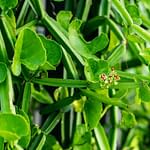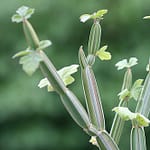
Ever heard of an Ayurvedic plant whose stems resemble the shapes of bones and joints of a human body? Or a plant that’s known to make the body as strong as a diamond? That’s Cissus Quadrangularis for you.
We know that this botanical name is a mouthful, hence, you can call it by its other, simpler names: Hadjod (Hindi name), Asthi Samharaka/Asthi Shrunkhala/Vajra Valli (Sanskrit name), or Devils’ Backbone/Edible Stemmed Vine/Veldt Grape (English name). It is interesting to note that the term, “Asthi Samharaka” literally translates to a substance that heals, prevents, and protects the bone from all kinds of destruction (such as fractures etc.). Plus, if you’re suffering from low bone mineral density or osteoporosis, this herbal, perennial plant comes in handy.
“A well-lived day is medicine unto itself.” ― Acharya Shunya
Nutritional Information & Recommended Dosage
- Plant decoction: 15-20 ml twice a day. It can be consumed along with milk/ghee. The maximum possible dosage for the decoction is 40 ml (in divided doses).
- Powder form: Less than 1.5 mg for children and less than 3 gm for adults. Remember that the maximum dosage for this should not exceed more than 6 gm (that too in divided doses).
- Capsule form: 1-2 tablets, twice a day.
Handy tip: Since Hadjod has hot potency, it is better if the stems are fried in ghee before consuming. Doing this reduces the heat it generates once consumed.
Important: Please consult your doctor before consuming this herb to understand the right dosage for your needs.
Hadjod’s Multi-Dimensional Uses: An Overview
“Tie Pirandai (Hadjod) around the stomach that has borne a child for relief.” – An old Tamil adage
Often times, you’ll read that Cissus Quadrangularis’ stems and leaves are primarily used to strengthen your bones and joints. And rightly so. The Hadjod plant comes power-packed with Calcium ions, Vitamin E, Vitamin A, and carotenoids. In fact, the Hadjod tree has been used in ancient folklore to treat fractured bones across the Indian subcontinent and is useful for treating rickets in children. Additionally, this wondrous plant can be used for treating other health problems as well such as:
Hadjod: Indications
- Relieves constipation.
- Strengthens the bones and reduces fracture pain/swelling.
- Removes worm infestation and treats infectious wounds.
- Induces metabolism and aids in better digestion.
- Works as a potent aphrodisiac and boosts immunity.
- Treats issues such as gout, obesity, syphilis, piles, diabetes, high cholesterol, peptic ulcer, among other things.
- Reduces obesity and helps people to lose weight.
Did You Know?
Research suggests that the Hadjod tree contains useful compounds that can reduce the bone-healing duration by 30-50%!
Moving on, let’s understand more about the plant and its physical properties. Belonging to the Vitaceae (grape) family, the Hadjod plant grows up to 1.5 m tall and comes with leafless, quadrangular stems. This plant typically flowers and bears fruits in the autumn season. It typically grows in warmer climates and is found all over India, parts of Asia, and Africa.
The Hadjod Herb’s Physical Characteristics & Medicinal Properties
Physical Characteristics:
- It is light to digest and dry in nature.
- It is sweet in taste and becomes pungent post digestion.
- It has hot potency and is known to balance the Vata and Kapha Doshas.
Medicinal Properties:
- Pain-reliever
- Anabolic supplement
- Hemostatic agent
- Digestive stimulant
- Hepatoprotective
- Aphrodisiac
- Blood purifier
- Anti-oxidant
- Analgesic
- Anti-inflammatory
Hadjod’s Herbs All-Round Application: The Top-5 Forms
- Hadjod powder: The dried ash collected from the plant’s shoots are used for treating digestive issues.
- Hadjod juice: Fresh juice extracted from the plant’s stem and leaves are used for a variety of purposes.
- Hadjod oil/paste/cream: A paste – extracted from its mature stem and mixed in warm water – is applied topically on fractures and wounds for a speedy recovery.
- Hadjod supplement: Its supplement form is used for body-building purposes.
- Hadjod in the raw form: Its stem and leaves are used as a vegetable and enjoyed in across India mainly in the curry form. In fact, you can also make papad and pickles using this super amazing herb. In West Bengal, this chutney (check below) is given to people suffering from haemorrhoids.
A DIY Hadjod Chutney for Stomach Issues
The following chutney recipe helps to treat a number of stomach disorders such as gastritis, intestinal disorders, ringworm infestation, etc.
- Heat a tablespoon of sesame oil.
- Add a pinch of asafoetida (hing) and fry 3-4 dried red chillies (optional), a teaspoon of urad dal, and a few sesame seeds in it.
- Take it out. Next, in the same oil, fry the Hadjod pieces and leaves until soft.
- Finally, blend the ingredients together with tamarind, salt, jaggery, and water.
And you’re done!
Ayurvedic Medicines with Cissus Quadrangularis as the Primary Ingredient
- Panchajeeraka Gudam: This herbal jam is a God-send when it comes to treating post-natal issues, respiratory problems as well as digestive issues.
- Lakshadi Guggul: This ayurvedic medicine in the tablet form is famous for treating fractures and bone-related issues. Note that this Ayurvedic medicine is often combined with Gandha Thailam and Abha Guggul.
Did You Know?
The plant’s ash also serves as a perfect substitute for baking powder.
Hadjod’s Versatile Benefits & Home-Remedies: At a Glance

“Hadjod supports the delicate, healthy equilibrium between bone restoration and bone formation.” – Himalaya Drug Company
Cissus Quadrangularis’ benefits are varied and extremely useful if used correctly. It can be used internally as well as externally. Let’s take a look at its multipurpose benefits and easy-to-implement home remedies you can give a shot:
Osteoarthritis / Fatigue / Joint Pains
What if we told you there was a natural calcium supplement you can make at the comfort of your home and get rid of any lethargy and pain in joints, as well as accelerate the healing of fractured bones? Sounds too good to be true, right? According to research, Hadjod helps in lowering pain, swelling, and fracture mobility. Additionally, it speeds up the healing of fractured jawbones. It is also known to boost the bone mineralization process in addition to helping in bone formation. In fact, regular intake of Hadjod can reduce the chances of osteoporosis occurring by 40%!
The Suggested Remedy: Simply take 2-3 gms of the dried Hadjod stem powder along with a teaspoon of honey two times a day to get rid of any kind of joint pain. Alternatively, you can fry the plant’s stem in ghee/sesame oil and consume this with milk to treat arthritis pain.
Throat infection / Cough / Hoarse voice
Take the stem of the plant and extract about a teaspoon of its juice. Mix this fresh juice with 1 teaspoon of honey and consume for immediate relief.
Fractures And Related Pain
You can make a paste using the plant’s stem and grinding it with egg albumin. Simply, apply this fine paste topically and place a bandage over it. Your wound will heal in no time. Conversely, you can 10 gm of the Hadjod powder, add two cups of water to it and boil till it gets reduced to half the quantity. Strain and consume twice a day.
Sprains
Grind a few pieces of the Hadjod herb along with turmeric, salt, and tamarind. Next, mix water in it and bring to a boil. Use this paste and apply topically to treat pain related to sprains and other bone injuries. Instead of water, you can also use the juice extracted from the Hadjod plant.
Burns And Scalds
If you wish to prevent boils and blisters, here’s a simple remedy: Take fresh Hadjod leaves and soak it in lime water for some time. Pour this juice over the burns and see the difference.
Boosting Appetite
You can take equal quantities of the stem powder and ginger powder (about 2-3 gm) and consume.
Syphilis
To treat syphilis, take 20 ml each of the Hadjod’s extracted juice and ghee, and consume twice a day, for a week (preferably post meals).
Abnormal Bleeding During Menstruation
For treating excessive bleeding during your periods, you can take 20 ml of the plant’s juice along with 3 gm of white sandalwood powder and a teaspoon of honey.
Hadjod’s Side-Effects & Precautionary Measures
Care must be taken when consuming Hadjod as it may have the following side effects:
- Burning sensation
- Dry mouth
- Excessive body heat
- Restlessness
- Insomnia
- Intestinal gas
- Headache
- Excess sweating
- Vertigo
- Diarrhoea
Here are Hadjod’s precautionary measures:
- Pregnant and lactating women should avoid consuming it in any form.
- Hadjod is known to reduce blood sugar levels, hence diabetic patients should seek expert help before consuming it.
- You should stop consuming Hadjod at least two weeks prior to any surgery.
Important: Please consume this herb under expert guidance only as a precautionary measure.
Where to Buy It Online?
There are a number of established manufacturers who produce Hadjod in various forms:
- Hadjod Himalaya: It promotes joint and bone wellness and is priced at INR 132 only.
- Naturemed’s Hadjod: This all-natural Hadjod powder helps in maintaining bone and joint strength.
- Lakshadi Guggul Baidynath: This medicine provides immediate relief from low bone density, osteoporosis, fractures, or other teeth and joint pains.
